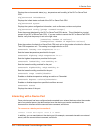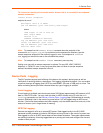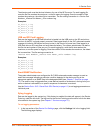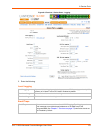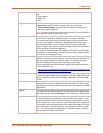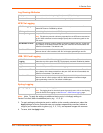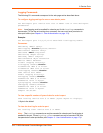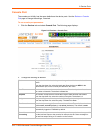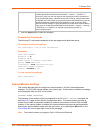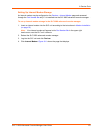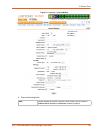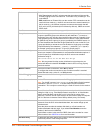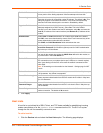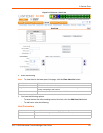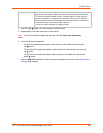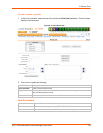
8: Device Ports
SLC™ 8000 Advanced Console Manager User Guide 126
3. Click the Apply button to save the changes.
Console Port Commands
The following CLI commands correspond to the web page entries described above.
To configure console port settings:
set consoleport <one or more parameters>
Parameters
baud <300-230400>
databits <7|8>
stopbits <1|2>
group <Local or Remote Group Name>
parity <none|odd|even>
flowcontrol <none|xon/xoff|rts/cts>
showlines <enable|disable>
timeout <disable|1-30>
To view console port settings:
show consoleport
Internal Modem Settings
This section describes how to configure an internal modem in the SLC advanced console
manager. The SLC 8000 internal modem is an optional part. If the modem is installed, a message
will be displayed when the SLC unit is booted:
Internal modem installed.
The presence of the modem will also be displayed in the CLI admin version command, the
web About SLC page, and the System Configuration report. The internal modem provides a
subset of the modem functionality available for modems connected to a Device Port and USB
modems. If the internal modem is installed, the Internal Modem web page can be displayed by
selecting the Internal Modem option from the main menu, or by selecting the MD button in the
Port Number Bar on the upper right corner of the web page.
Note: The internal modem only supports Dial-in, Dial-out and Dial-back.
Group Access If undefined, any group can access the console port. If one or more groups are
specified (groups are delimited by the characters ' ' (space), ',' (comma), or ';'
(semicolon)), then any user who logs into the console port must be a member of
one of the specified groups, otherwise access will be denied. Users authenticated
via RADIUS may have a group (or groups) provided by the RADIUS server via the
Filter-Id attribute that overrides the group defined for a user on the SLC 8000
advanced console manager. A group provided by a remote server must be either a
single group or multiple groups delimited by the characters ' ' (space), ',' (comma),
';' (semicolon), or '=' (equals) - for example "group=group1,group2;" or
"group1,group2,group3".



